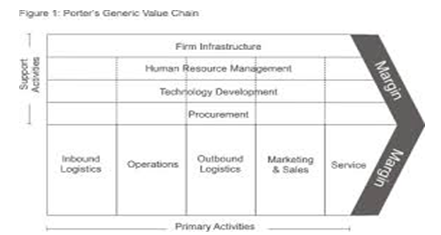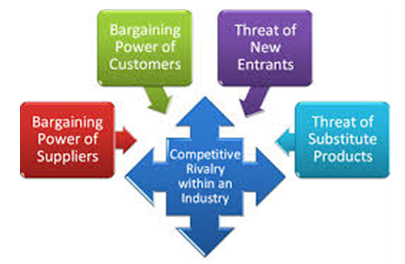Introduction
For any organization, the quest for competitive advantage requires that the company adopts a strategy that can decide the direction of business growth. Michael Porter proposes a model of three generic strategies that can be applied in understanding the makeup of business organizations. This paper compares two different organizations, Carrefour and Emirates Islamic Bank using Porter’s value chain analysis and Porter’s five forces model.
Description of Emirates Islamic Bank and Carrefour Using Porter’s Generic Strategies
A competitive strategy is perceived as a comprehensive blueprint for business growth and competition. Porter outlined three generic strategies for the attainment of competitive advantage. These include cost leadership, the focus business strategy, and the differentiation strategy.
Carrefour makes use of its size to implement the differentiation strategy and offer discounts on its products. Though Carrefour is largely based in Europe, the firm boasts of stores in four continents including the Americas, Asia, Europe, Africa, and the Middle East. The giant retailer focuses on entering new markets and has a considerable presence in the United Arab Emirates (UAE).
Carrefour functions in a diversity of retail structures such as hypermarkets, automotive centers, mini-markets, warehouse stores, and supermarket. The main household goods sold at Carrefour include household electronics, consumer goods, foodstuffs, and clothing. The company uses economies of scale to offer attractive prices and discounts to maintain a competitive advantage.
Emirates Islamic Bank provides all types of financial services in line with Islamic sharia, which outlaws usury. Emirates Islamic Bank implements a focus business strategy and aims to become a reputable provider of financial services.
This strategy suits the Emirates Islamic Bank since it seeks to fulfill a specific need in the financial services sector. It, therefore, focuses on a narrow segment of the financial market. Carrefour, on the other hand, provides a range of household goods and services, including family apparel, electronics, shoes, photo processing, toys, and fabric.
Emirates Islamic Bank uses the intranet, an interactive website, extranet, and a web-based e-CRM system to improve its leveraging of information technology and obtain a competitive advantage.
The ability of Emirates Islamic Bank to stand out from the crowd of organizations that provide financial services relies on its strategy of enhancing business functionality, service quality, and good customer relationships.
The Emirates Islamic Bank has partnered with the National Bank of Dubai to offer the best services to its clients. A safe, accessible, and reliable financial partner is what Emirates Islamic Bank seeks to become to set itself apart as a unique financial service provider.
Carrefour’s strategy involves the marketing of quality household products at the most affordable price. One of the techniques employed by Carrefour in its quest to become a market leader in the application of information technology, especially management information systems.
Carrefour also procures its supplies directly from manufacturers, thereby eliminating costly middlemen. The main divisions of Emirates Islamic Bank include sales and marketing, research and development, human resource management, and information technology.
Role of MIS in Generating Business Intelligence and Acquiring a Competitive Advantage
Information systems play a significant role in the adoption of any of the three generic strategies (Koontz, 2010). Companies in the same industry as Carrefour use the power offered by information systems to improve company presence and reduce the cost of advertising. Kmart, for instance, uses the internet to conduct e-procurement, which reduces the cost associated with the procurement process.
Organizations that adopt the differentiation strategy use information systems to create unique products in their organizations. Banks apply advanced technological steps to measure the effectiveness of their advertisement campaigns (Monks & McMackin, 2001). Differentiated companies can also use social networking to understand customer needs so that they can tailor their services to customer preferences.
Porter’s Value Chain Analysis of Carrefour and Emirates Islamic Bank
Porter’s value chain model describes an organization’s processes and connects the processes to the competitive location of the organization (Koontz, 2010). The value chain analysis seeks to assess the contributions made by each activity to the company products. Porter’s value chain model identifies primary activities and sets them apart from support activities.
The figure below represents Porter’s value chain analysis.

While primary activities are directly concerned with the generation of the product, support activities assist in the facilitation of efficiency and effectiveness of the products or services.
According to Porter’s value chain analysis, primary activities can be categorized as outbound logistics, marketing and sales, operations, inbound logistics, and service. Support activities in the value chain analysis include human resource management, procurement, infrastructure, and technological development.
The value chain model outlines certain business processes which require competitive strategies and the application of information systems. Information systems can be leveraged by Carrefour and Emirates Islamic Bank to improve the value of their processes and obtain a competitive advantage.
Carrefour employs a value web that seeks to improve the efficacy of the value and supply chains by linking the organization to its partners, customers, and suppliers.
Some important primary activities to consider include inbound logistics management as well as outbound logistic management (Koontz, 2010). For both companies, inbound logistics includes activities that facilitate the acquisition, storage, and dissemination of input. Carrefour possesses a fast and well responsive transport equipment system boosted by more than six thousand trucks.
The philosophy of the Carrefour is decentralization, and the company uses resources to execute the cost leadership strategy. In terms of logistics, Carrefour conducts a host country purchasing for its retail products, which allow the company to meet local government regulations.
For Emirates Islamic Bank, some of the financial services offered coincide with sale processes of the bank. Other services such as mortgages are delivered at a later date. Product delivery at Emirates Islamic Bank is highly reliant on information technology such as automated teller machines. Functions within the marketing aspect of the Emirates Islamic Bank include promotions, data marketing, web design, and direct mail.
Using Porter’s Five Forces Model to Compare Emirates Islamic Bank and Carrefour
Porter’s five forces model is a business strategy assessment tool that examines the value of an industry (Koontz, 2010). It helps an organization’s management to comprehend the position of the company in a competitive market as well as possible products and ventures.
The five forces model examines five factors, which include competitive challenge, new entrants into the market, possible substitute products, power of customers, and the power held by suppliers.

Traditional Competitors
When analyzing an industry, understanding the power of existent competitors is important, especially if there is little differentiation between the products of the company and competing products (Koontz, 2010).
The chief traditional competitor to Emirates Islamic Bank for its Islamic banking market is the Abu Dhabi Islamic Bank (ADIB), which commands a considerable percentage of the banking market share in the United Arab Emirates.
Carrefour, on the other hand, faces competition from other household essential companies like Kmart, Sears, and Home Essentials General Trading LLC. With Sears and Kmart growing their presence in the UAE, Carrefour faces strong competition for the market for its products.
Threat Posed by New Entrants into the Market
When it is easy for new companies to enter the market, the threat to existing organizations is likely to be high (Wei, 2006). It is relatively difficult for new foreign banks to enter the UAE Islamic banking market. This means that Emirates Islamic Bank is relatively safe from the cutthroat competition that is often introduced by the entry of foreign banks.
New entrants to a market affect the profitability of existing companies by introducing new competition, thereby distorting the attractiveness of the industry (Koontz, 2010).
For the household essentials industry, the entry barriers for new companies in the UAE are relatively high. Carrefour, therefore, is not likely to worry about competition posed by novice companies. However, compared to Emirates Islamic Bank, the market of Carrefour is more likely to attract new entrants since it is less guarded by Islamic laws.
Substitute Products
Though the customers of Carrefour have more options regarding alternative products, the low prices offered by Carrefour due to economies of scale cannot be easily matched by other companies. Online shopping provides an alternative to the variety of products provided by Carrefour.
In the case of Emirates Islamic Bank, the other alternative products available to the clients of Islamic banking are loan shark services and conventional banking. However, Islamic banking has more appeal in the UAE than conventional banking due to the people’s religious beliefs and the low-interest rates compounded by Islamic banks.
Moreover, loan shark services are procured as a last-minute resort due to their exploitative nature. Other alternatives to Islamic banking include taking loans from friends, investing in homes and the stock market as well as keeping money in homes.
The Bargaining Ability of Customers
Customers of a company can influence the direction taken by the firm, especially when there is little differentiation from the services or goods offered by competing firms (Becker & Huselid, 2006). The customer base of Emirates Islamic Bank for its Islamic banking services is not restricted to any social class in the UAE community.
On the contrary, the bank offers its services to any citizen in need of financial intermediary services. Since the business of Emirates Islamic Bank relies considerably on the savings done by its customers, customers are very influential in determining the future and profitability of the company.
Unlike Emirates Islamic Bank, which is heavily reliant on customer tastes and preferences, Carrefour rarely takes the needs of its customers into consideration. On the contrary, Carrefour banks on the convenience it offers a one-stop shopping place for most household goods. The customer, therefore, does not significantly influence the operations at Carrefour.
The power of Suppliers
The main suppliers of Emirates Islamic Bank are the company’s customers. Other suppliers do not have the power over the bank since the products that they supply can be easily accessed from other suppliers.
Some of the suppliers of Carrefour include Kraft Foods, Nestle, Procter & Gamble, Hewlett-Packard, Unilever, and Johnson & Johnson. These suppliers influence the pricing of Carrefour products since they are the main producers of the goods and services.
Proposal for Improvement
Carrefour can apply information systems to reduce the cost of conducting business, thereby lowering the cost of goods and services. It can implement an online business-to-consumer model to reach its customers and eliminate the costs associated with retail stores and middlemen and obtain a competitive advantage. Emirates Islamic Bank can use information systems to create differentiated feature unique to its Islamic customer base.
References
Becker, B. & Huselid, M. (2006). Strategic Human Resources Management: Where Do We Go From Here? Journal of Management, 32(6), 898-925.
Monks, K. & McMackin J. (2001). Designing and aligning an HR system. Human Resource Management, 11(2), 57–72
Koontz, H. (2010). Essentials of management. USA: Tata McGraw-Hill Education.
Wei, L. (2006). Strategic human resource management: Determinants of fit. Research and Practice in Human Resource Management, 14(2), 49-60.